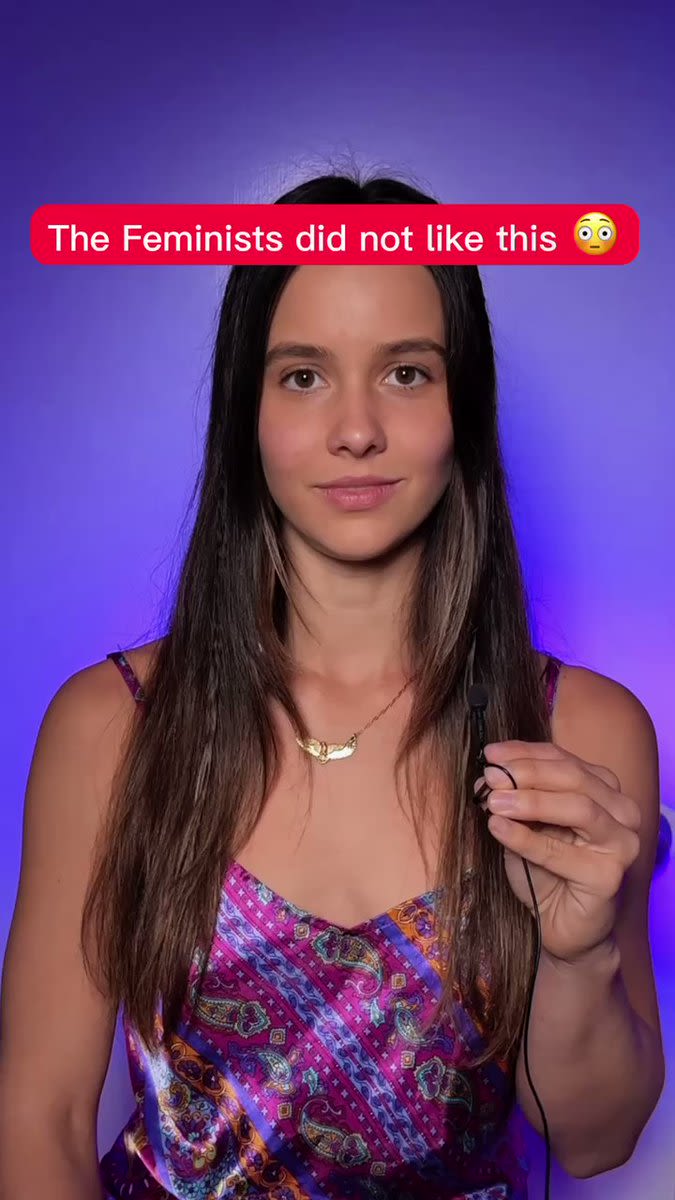Welcome to TikTok’s Anti-Feminist Influencers
Are the “trad life” personalities on social media changing the culture or just selling a lifestyle brand, like the right-wing equivalent of Goop?
Recently, my friend Indian Bronson tweeted about the preponderance of anti-feminist influencers who promote “traditional values” online. These women seem to appear on the scene overnight, quickly amass followers, and become small-time celebrities. Bronson is right to notice this: One of the best known and least utilized social media hacks, if you’re an aspiring female influencer, is that conservatism sells. In a Discord server I’m in, an anonymous young woman quipped to a young man asking how to launch himself into internet stardom, “If you want to be an influencer, just catfish as a right-wing woman.”
For Bronson, the reason for this easy appeal is that “almost every mainstream institution/popular culture outlet is about satiating/validating fat, promiscuous, cultureless consumers. These young women are appealing to healthy, traditional, identity-exclusive tastes. It’s upscale.” That’s how trends work: When you oversaturate one category, like the choice feminism that defined the millennial generation, your only remaining options are to innovate on the trend or offer a sufficiently different alternative. It’s not such a crazy idea that after nearly a decade of liberal-slanted, socially permissive media, we’re due for a “vibe shift.”
Trad influencers like Shannen Michaela or JustPearlyThings have been able to build lucrative followings by turning the idea that “feminism is a scam” into a desirable-looking lifestyle brand. That’s worth something, obviously, but it doesn’t make them the future of the culture, and it’s not clear just how far their influence extends.

Politically, it’s doubtful that these influencers are changing anyone’s mind. Nobody is going to be convinced of “the truth about feminism” by somebody who acts as if they might have berated you on a college campus about your perceived support of Bernie Sanders. For the most part, the anti-feminist trads don’t reach people who aren’t already sympathetic to their views.
One woman I spoke to claimed her only exposure to these types of trad influencers came when she saw liberal accounts mocking the perceived ridiculousness of their videos or otherwise critiquing their politics. It’s the same reason that an earlier wave of “trad” women in the media, like Lauren Southern, didn’t spark a cultural revolution, despite gaining massive followings. Fundamentally, this content is for people already in that milieu—arguably, it’s not even for women.
What might be happening, however, is an embrace of traditional and right-wing coded values in less obvious ways. I spoke to 10 young women who identified as apolitical, centrist, or leftist about this, and they described a few different expressions of these changes.
One was conservatively slanted content from creators you wouldn’t think to describe as socially conservative, some of whom may even identify as leftists. This seems to be more of a change in sensibility: an acknowledgment from a diverse group of people that modern “lean-in” feminism is lacking something, although that acknowledgment is not necessarily framed in a politicized way. Areas of concern mentioned by the women were diverse, including hormonal birth control; hookup culture; the material, biological realities of womanhood; and the impact of porn on young women.
M., a millennial entrepreneur in the media industry, had a more cynical perspective. She sees the new feminine-trad influencers as the predictable backlash to the past decade of stock-standard girl-boss figures. These days, M. said, creators are focusing more on “feminine energy” instead of corporate empowerment anthems. Promoting femininity is a way to sell deeply conservative values under the guise of neutrality, she argues. “The best way to politicize is to sound apolitical.”
Another woman, Aziza, an “Extremely Online” millennial told me, “I think broadly it’s representative of an idea that there is a metaphysical component to womanhood, but that component is linked to biological essentialism. Which is, to me, a pretty clear reaction to the trans movement and the broader debates about ‘what is a woman.’”
In the same broad group as the trad-feminine influencers, there are also self-critical leftists who share many of the same concerns as right-wingers, and ordinary women without a clear political agenda. Sometimes these women are kidding around, joking about wanting to become housewives or about how the structure of professional life isn’t very comfortable for women; sometimes they’re sharing heart-wrenching personal stories. The through line is that something isn’t working.
For many of these women, the general dissatisfaction with how things are is accompanied by their desire to identify against what’s normative. They want to rebel against the HR department in their heads and say fuck off to the internalized voice reminding them to greet everyone with “hey, folks,” instead of “hey, guys.”
This group might follow conservative influencers online, but that doesn’t necessarily mean they’re conservative. E., a 25-year-old in Texas, told me, “There’s a range of them. Millennial anti-vaxxer home birthers, ‘classical’ girls who believe in modesty and using tallow balm as organic skincare, or girls into NFTs that got into crypto a year and a half ago and their new internet circles have just changed their sensibilities and sense of humor.”
One phrase kept coming up in these conversations, again and again: “Red Scare adjacent.” “Red Scare” being the podcast of the hour and generator of countless trend pieces, including some of my own. E. described the “memetically conservative” as part of the Red Scare Extended Universe.
“It’s a podcast for girls that are excited about saying bad words that are no longer acceptable to speak in mixed company in their cities,” E. said. “The girls who like ‘Red Scare’ are not really that conservative. They’re rejecting what’s surrounding them online and in college—an overbearing P.C. sensibility.” But, as E. notes, “that doesn’t mean any of them will actually pivot to trad wifery and homesteading.”
It’s impossible to predict where we’ll end up or how significant the meme-ists are, especially in the more tangibly political. Perhaps we’re even “post-politics” or, more broadly, “post-sincerity.”
Whatever happens, I’m not discounting beef tallow skincare lines at Target, Steppe warrior tees at Walmart, or best-selling How to Be a Tradwife self-help books just yet.




Glad to see this concise analysis has broken away from the confines of Twitter. The persistence (or lack thereof) of this trend will be something to watch, especially since America shows less willingness to pump the cultural brakes on "gender ideology" as much as the more "TERF-y" countries like the U.K.
Shannen Michaela is a grifter that used to have an onlyfans, dont even get me started. This is all just fake trad shilling because she knows there's $ behind it. Same reason why she shills nfts to clueless idiots nowadays. But yes someone is definitely scripting her.